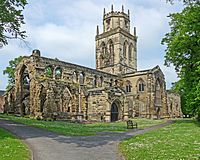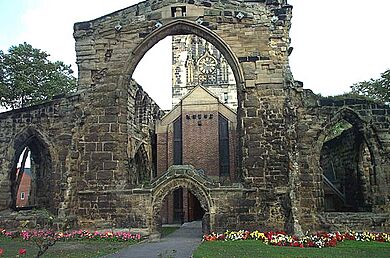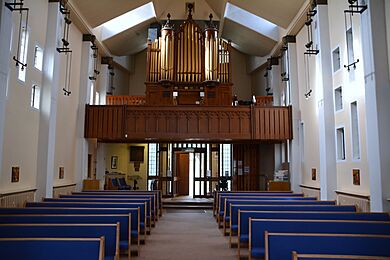All Saints' Church, Pontefract facts for kids
Quick facts for kids All Saints' Church |
|
|---|---|
| Church of All Saints | |
 |
|
| 53°41′46″N 1°18′03″W / 53.69613°N 1.30074°W | |
| Location | North Baileygate, Pontefract, West Yorkshire |
| Country | England |
| Denomination | Church of England |
| Website | http://www.cofe-pontefract.co.uk/all-saints/ |
| History | |
| Status | Parish church |
| Architecture | |
| Completed | 14th-15th century (outer church) 1967 (inner church) |
| Administration | |
| Parish | Pontefract |
| Deanery | Pontefract |
| Archdeaconry | Pontefract |
| Diocese | Leeds |
| Province | York |
All Saints' Church in Pontefract, West Yorkshire, England, is a special Church of England church. It is known for having two parts: an older, ruined outer church from the 14th and 15th centuries, and a newer, smaller inner church built inside it in the late 1960s. This church is a Grade II* listed building, which means it's a very important historical site. It's one of two Anglican churches in Pontefract town centre.
Contents
A Look Back: Church History
The older part of All Saints' Church was built between the 1300s and 1400s. It played a role in the English Civil War, a big conflict in England during the 1600s.
The Church During the Civil War
At the start of the Civil War, the church was held by the Royalists, who supported the King. In December 1644, the Parliamentarians, who supported Parliament, surrounded the church. The Royalists inside had 11 cannons! The church was badly damaged during this attack. For example, 60 large cannonballs were fired at it in just one day.
In June 1645, the Parliamentarians took over the church. But then, the Royalists, who were in Pontefract Castle nearby, surrounded the church again. To defend themselves, the Parliamentarians used materials from the already damaged church to build new defenses. By 1649, the church roof was completely gone.
Church Design and Style
All Saints' Church has a unique design because it combines very old ruins with a modern building.
Outside the Church
The Old Outer Church (14th-15th Century)
The outer part of the church dates back to the 1300s and 1400s. It is mostly in ruins now. Some changes were made to these ruins in 1838. The old church is shaped like a cross and is built from sandstone. The ruined main part, called the nave, has north and south entrances. The newer church is built inside this ruined nave. The old structure also has an eight-sided tower that was added in the 1700s.
The New Inner Church (20th Century)
The smaller, inner church was finished in 1967. It was designed by an architect named George Pace. This part of the church is made of brick and has a sloped roof. You can see five medieval (Middle Ages) stone heads decorating the front of this newer section.
Inside the Church
Inside the Old Outer Church
The old nave has rows of arches with eight-sided pillars. However, the 1967 church was built over much of the old floor plan, so some parts are now hidden.
Inside the New Inner Church
The inner church, completed in 1967, originally had pews from the Victorian era, but these have since been replaced. There's a special arched space for a tomb on the south side. The walls have windows that are placed in a way that they don't get blocked by the old ruins. The roof also has skylights, letting in natural light. The walls inside are painted white. Above the entrance, there's a raised area called a mezzanine, where a pipe organ is located. The church also has an eight-sided stone font, which is used for baptisms.
Finding the Church
All Saints' Church is located on North Baileygate. It's separated from the main town centre by Pontefract Castle, which is to the west. The closest train station is Pontefract Monkhill, which is about a quarter of a mile away.
See also
- Grade II* listed buildings in West Yorkshire
- Listed buildings in Pontefract



